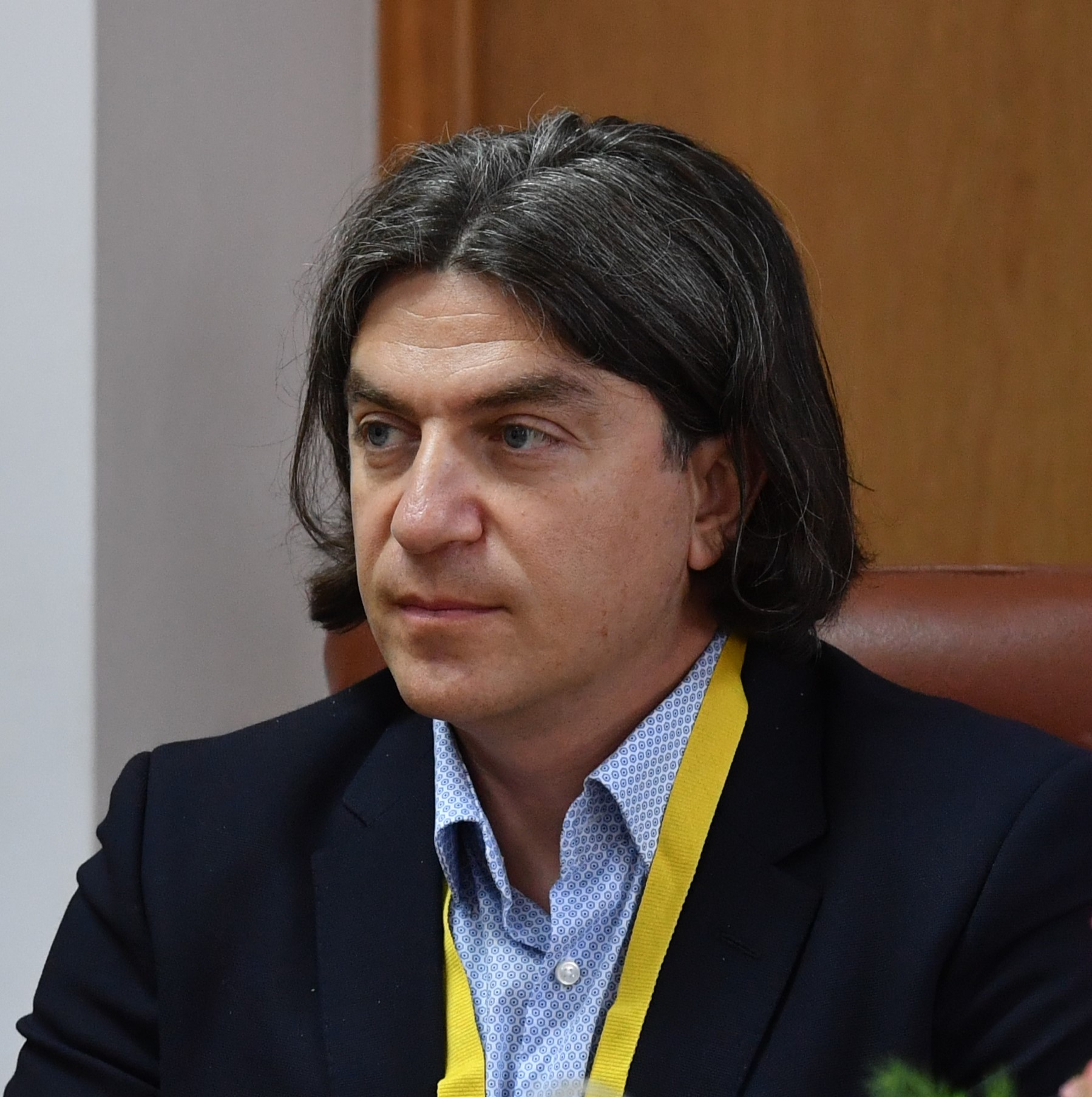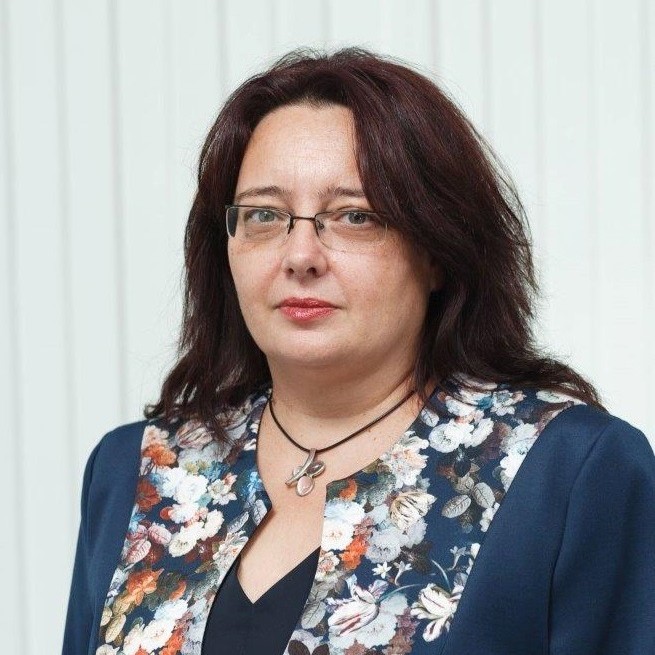20 - 22 June, 2023, Constanta, Romania
The 7th Black Sea Cybersecurity Conference
Cyber ETEE Conference
Securing the Seas: Exploring the Dynamics of Cybersecurity in Maritime Environments

Excellence in Cybersecurity
About The Event
The BSCySEC conference series started in 2017 and has since been followed by significant events in 2018, 2019, 2020, and 2021. The conference has consistently featured esteemed speakers with extensive expertise in cybersecurity policy and its practical applications within the maritime industry. The participation of institutional actors in recent editions of the conference has undeniably impacted global perceptions and actions regarding cybersecurity. The measures implemented as a result have led to enhanced responsibility and effectiveness in the realm of emerging and innovative technologies.
The “Securing the Seas: Exploring the Dynamics of Cybersecurity in Maritime Environments” conference is a leading international gathering of experts, scholars, and practitioners focused on the critical intersection of cybersecurity and the maritime industry. The conference aims to foster interdisciplinary dialogue and collaboration among participants from academia, industry, government, and civil society on the maritime sector’s pressing cybersecurity issues.
This 7th Edition features a comprehensive range of topics, including emerging technologies, cyber threats and vulnerabilities, ethical considerations, and strategies for enhancing cybersecurity resilience. Through a series of expert panels and guest lectures, participants will gain insights into the complex and evolving cybersecurity landscape in the maritime environment and explore best practices and lessons learned in cybersecurity policy and practice.
The conference is a unique platform that brings together leading experts and stakeholders from around the world to develop sound strategies and promote the development of effective cybersecurity policies and practices in the maritime industry. It will contribute to building a common cybersecurity agenda, foster greater awareness and understanding of the cybersecurity challenges facing the maritime industry, and promote collaboration and partnerships among stakeholders to enhance cybersecurity resilience.
Context
The significance of cybersecurity in Europe and worldwide extends beyond mere protection, as it plays a vital role in fostering and safeguarding democratic principles and values. The rapid technological advancements and the emergence of new technologies such as artificial intelligence and quantum computing are key drivers of social and technological progress. Consequently, the state of cybersecurity becomes crucial for the acceleration of societal evolution along these new trajectories. The growing importance of cybersecurity has been further amplified by global challenges such as climate change, human rights violations, global ethics, war and peace. The Euro-Atlantic region faces an exceptionally elevated level of cyber risks owing to its unique geopolitical landscape and the presence of highly interconnected and technologically advanced communities. These factors make the region an attractive target for both state-sponsored and non-state cyber attackers. In the global landscape, the maritime industry holds immense significance due to its inherent nature and its capacity to impact the world economy through strategic ripple effects. Addressing cybersecurity challenges within the maritime sector is exceptionally complex, given its role as a convergence point for critical infrastructures. This convergence amplifies the risk of contagion and the potential for adverse consequences, which are challenging to quantify and anticipate accurately.
Where
Maritime University of Constanta
Online: https://etee-summer.school/
When
20-22 June, 2023 Tuesday to Thursday
Panels
In the digital age, politics and technology are increasingly intertwined, shaping our world today. The rise of information and communication technologies (ICTs) has revolutionized the way we interact with each other, conduct business, and engage in political processes. This panel will explore how these developments are transforming politics in the Black Sea Region and beyond, with a particular focus on energy security, cyber politics, and the future of digital sovereignty.
Panellists will tackle pressing questions such as: How are digital technologies changing the nature of liberal democracy? Can ICTs be a powerful tool for challenging authoritarian regimes? Are they helping or hindering international security? And, will ICTs render states obsolete by empowering subnational and supranational actors?
Drawing on their expertise, panellists will explore a range of topics, including national security, energy security, digital sovereignty, e-democracy, social capital, online censorship and surveillance, cybersecurity, privacy, and transnational activism in the Black Sea Region and beyond.
Join Panel 1 as the distinguished panellists will navigate the complex intersection of politics, technology, and energy security and explore the implications for the future of digital sovereignty, cybersecurity, and energy security in the Black Sea Region and beyond.
Artificial intelligence (AI) transforms the cybersecurity landscape, providing new opportunities and posing unprecedented risks for the maritime industry. This panel will explore the latest developments in AI and cybersecurity with a focus on their synergies and discuss their implications for the safety and security of the seas.
Panellists will delve into key questions, such as: How can AI be used to detect and prevent cyber attacks on ships and ports? What are the ethical and legal implications of using AI for cybersecurity purposes? Can AI help to overcome the shortage of skilled cybersecurity personnel in the maritime industry? What are the potential risks and unintended consequences of relying on AI for cybersecurity?
Topics of discussion may include: the use of machine learning algorithms for threat detection and response, the integration of AI into security operations centres, the development of AI-powered cyber defence systems, the legal and ethical implications of autonomous cybersecurity decision-making, and the impact of AI on the maritime cybersecurity workforce.
Join Panel 2 as the distinguished panellists will explore the opportunities and risks associated with using AI to secure the seas and consider the implications for the future of maritime cybersecurity.
As our world becomes increasingly digitalised, the need to address ethical considerations in cybersecurity has become more important than ever before. The state actors have a crucial role in navigating these ethical considerations and ensuring that cybersecurity measures are implemented responsibly and ethically. This panel will explore the challenges and opportunities related to ethics in the rapidly growing field of cybersecurity.
Panellists will investigate critical questions such as: What are the ethical implications of using advanced technologies for cybersecurity purposes? How can the state ensure that cybersecurity measures are transparent, accountable, and equitable? What role should the state play in regulating cybersecurity practices in the private sector?
Topics of discussion may include: the ethical implications of data privacy and surveillance, the role of artificial intelligence in cybersecurity, the ethical considerations of using biometric authentication and identification, the role of the state in cybersecurity education and awareness-raising, and the ethical implications of cybersecurity for vulnerable populations.
Join Panel 3 as distinguished panellists will navigate the complex ethical considerations in the growing digitalisation and cybersecurity era and explore the opportunities and challenges for organisations, policymakers, and individuals.
Cyber threats continue to evolve and become increasingly sophisticated; therefore, it is essential that democracies work together to address shared cybersecurity challenges. This panel will explore the challenges and opportunities of cybersecurity cooperation among democracies and discuss a comprehensive European approach for enhancing global cybersecurity resilience.
Panellists will answer a set of stimulating questions: What are the key challenges facing democracies regarding cybersecurity, and how can cooperation address these challenges? What are the opportunities for democracies to work together to enhance cybersecurity resilience? How can democracies collaborate to promote shared values and principles in the digital age? What are the ethical and human rights considerations in cybersecurity cooperation, and how can these be integrated into a holistic approach that balances security and privacy?
Topics of discussion include the role of public-private partnerships in cybersecurity cooperation, emerging technologies in cybersecurity and their implications for democracies, the importance of information sharing and transparency in promoting cybersecurity resilience, and the impact of cyber threats on democracies’ national security.
Join Panel 4 as distinguished panellists will explore the challenges and opportunities of cyber security cooperation among democracies and discuss a comprehensive European approach for addressing shared cybersecurity challenges.
The Euro-Atlantic area faces increasingly complex and sophisticated cyber threats. NATO policymakers need to understand the current trends and implications of the cyber-defence landscape. This panel will explore Euro-Atlantic cyber-defence’s evolving trends and implications and discuss strategies to enhance regional cyber resilience.
What is NATO’s role in promoting Euro-Atlantic cyber-defence? How can NATO member states collaborate to enhance collective cyber resilience? What are the implications of the evolving cyber-defence landscape for Euro-Atlantic security and cooperation?
Topics of discussion include: NATO’s cyber defence strategy, the role of emerging technologies in cyber defence, the importance of public-private partnerships in enhancing Euro-Atlantic cyber resilience, and the implications of emerging cyber threats for NATO’s military posture.
Join Panel 5 as distinguished panellists will navigate the complex and evolving Euro-Atlantic cyber-defence landscape, explore the trends and implications, and discuss strategies for enhancing regional cyber resilience.
With the increasing reliance on digital technologies in maritime environments, there is a growing need for innovative solutions that can ensure secure and reliable communication, data sharing, and transaction management. This panel will explore how blockchain, IoT, and other similar technologies can be leveraged to enhance cybersecurity in the maritime industry.
Panellists will discuss the implications of blockchain and IoT technologies on data privacy and protection in the maritime industry and how these can be addressed. Questions: How can the maritime industry ensure blockchain and IoT technologies are interoperable with existing systems and standards? What is the potential impact of blockchain and IoT technologies on the maritime industry’s future, and how can industry stakeholders prepare for these changes?
Topics of discussion may refer to: the use of blockchain and IoT technologies in maritime supply chain security, the impact of these technologies on vessel and port security, the potential risks and unintended consequences of using blockchain and IoT for maritime cybersecurity, and the role of public-private partnerships in enhancing maritime cybersecurity.
The panel will bring together experts from academia, industry, and government to share their insights and experiences in using these technologies to address cybersecurity challenges in the maritime domain.
As the European Union (EU) and the United States (US) continue to expand and deepen their digital footprints, cybersecurity policy and resilience have become increasingly critical. This panel will explore the challenges and prospects of EU and US cyber security trends in a rapidly evolving landscape.
Panellists will discuss key questions such as: What are the key challenges facing EU and US cyber security policy today? What role should the EU and the US play in regulating cyber security practices across the Euro-Atlantic area? How can the EU and the US leverage their collective strength to enhance cyber security resilience in the Euro-Atlantic area and globally? What role should the EU play in promoting a culture of cybersecurity resilience across member states?
Topics of discussion may refer to: the EU and US approach to critical infrastructure protection, the role of public-private partnerships in strengthening cybersecurity and cyber-resilience in the EU and the US, the impact of EU and US data protection regulation on cybersecurity, and the prospects for EU and US cybersecurity leadership on the global stage.
Join Panel 7 as distinguished panellists will explore the challenges and prospects of EU and US cyber security trends and consider the implications for the future of cybersecurity in the Euro-Atlantic area and beyond
In today’s rapidly evolving digital landscape, building resilience in societies and communities against cyber threats is increasingly important. This panel will explore various strategies and best practices for building cyber society resilience, as well as discuss ways to empower individuals and communities to protect themselves in the face of cyber attacks. As we navigate the challenges of the digital age, building cyber society resilience is critical for promoting a safe and secure online environment for all.
Panellists will investigate critical questions such as: What are the key components of building cyber society resilience, and how can they be implemented in practice? How can individuals and communities be empowered to protect themselves against cyber threats? What role should education and awareness-raising play in building cyber society resilience?
Topics of discussion:
- Developing a comprehensive approach to building cyber society resilience, including strategies for prevention, detection, and response to cyber threats.
- Empowering individuals and communities to protect themselves against cyber threats through education and awareness-raising initiatives.
- The role of public-private partnerships in promoting cyber society resilience, including collaborations between government, industry, and civil society.
- Promoting ethical and human rights considerations to build cyber society resilience.
As global trade continues to grow and the maritime industry becomes increasingly digitised, securing global maritime supply chains against cyber threats has become a critical priority. The threat of cyber-attacks poses significant risks to the stability and security of the global economy, making it essential to explore the challenges and best practices for enhancing cybersecurity resilience in the maritime industry. This panel will examine the current state of cybersecurity in global maritime supply chains and discuss strategies and collaboration necessary to address the challenges posed by cyber threats.
Panellists will delve into critical questions such as: What are the key cyber threats facing global maritime supply chains, and how can they be addressed? How can collaboration between governments, industry, and civil society enhance cybersecurity resilience in maritime supply chains? What role can emerging technologies play in enhancing cybersecurity in the maritime sector?
Topics of discussion may include: the importance of risk assessment and risk management in securing global maritime supply chains, the role of public-private partnerships in enhancing cybersecurity resilience in the maritime industry, the impact of cyber threats on the global economy, and the potential implications of emerging technologies on the future of maritime cybersecurity.
In the rapidly evolving digital landscape, maritime environments face a growing array of emerging cybersecurity threats and challenges. This panel will delve into the dynamics of these threats and explore the unique challenges that arise in securing the seas from cyber attacks.
Panellists will examine a range of pressing issues and address thought-provoking questions: What are maritime industries’ emerging cybersecurity threats? How do these threats impact the safety, security, and operational resilience of maritime systems? What are the vulnerabilities of maritime infrastructure and communication networks? How can stakeholders collaborate to enhance cybersecurity preparedness and response in maritime environments?
Topics of discussion may include the risks associated with the Internet of Things (IoT) and interconnected maritime systems, the potential impact of ransomware attacks on maritime operations, the challenges of securing autonomous naval vehicles, the role of artificial intelligence (AI) in maritime cybersecurity, and the importance of international cooperation in combating maritime cyber threats.
Join Panel 10 as distinguished panellists share their expertise, analyze emerging cybersecurity threats specific to maritime environments, and discuss strategies and solutions to address these challenges. By understanding and confronting these evolving threats, we can better safeguard the seas and ensure the resilience of maritime systems in the face of cyber attacks.
This panel will discuss the importance of education in enhancing cybersecurity in the maritime industry. Panellists will highlight education initiatives promoting cybersecurity resilience, such as university programs, training programs, and certifications. The discussion will also include future directions for education and training in maritime cybersecurity, including emerging technologies and trends that will impact the industry.
The panel will address questions such as: What are the current maritime cybersecurity education and awareness initiatives, and how effective have they been? What are the key challenges facing the promotion of maritime cybersecurity education and awareness, and how can they be addressed? What is the role of education in building a cybersecurity culture in the maritime industry?
Join Panel 11 as distinguished panellists will explore the role of education in promoting maritime cyber security and discuss current initiatives and future directions. Panellists will offer a range of perspectives, drawing on their expertise in policy, industry, and academia, and provide insights into the latest developments in maritime cybersecurity education.
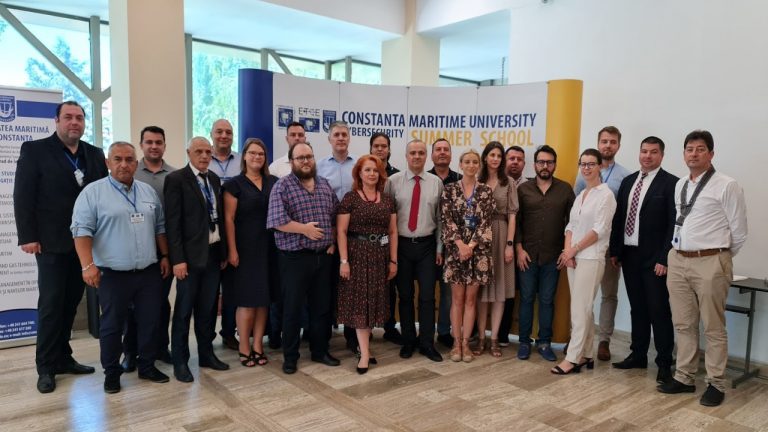
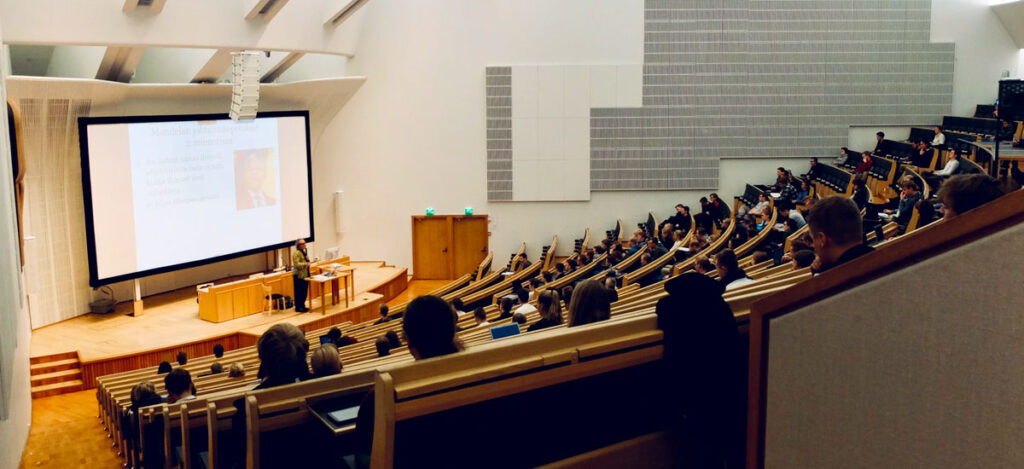
Have A Look At The
Event Schedule
Day 1
20 June, 2023
09:00 – 09:45 Opening Remarks
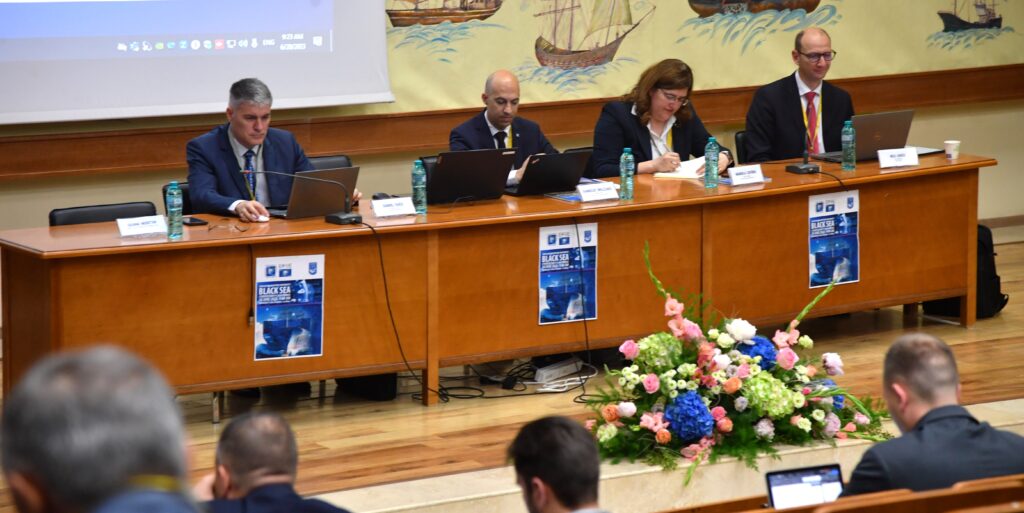
Speakers:
Panait Cornel, President of Senate at The Maritime University of Constanta, President of Advisory Board, MARCYSCOE
Gabriel Raicu, Vice Rector of CMU, Director, MARCYSCOE
Liliana Musetan, Head of Unit at Council of the European Union
Manuela Catrina, Deputy Director, National Cybersecurity Directorate
Horatius Garban, Head of Unit, RoU MoD, Cyber Defence Command
Evangelos Englezakis, Training Manager, European Security and Defence College, Co-organiser of the event (confirmed)
Host: Nicu Iancu, VP, MARCYSCOE
09:45 – 10:00 Coffee break
10:00 – 11:20 Panel 1. Cyber Politics, Energy Security, and the Future of Digital Sovereignty in the Black Sea Region and Beyond
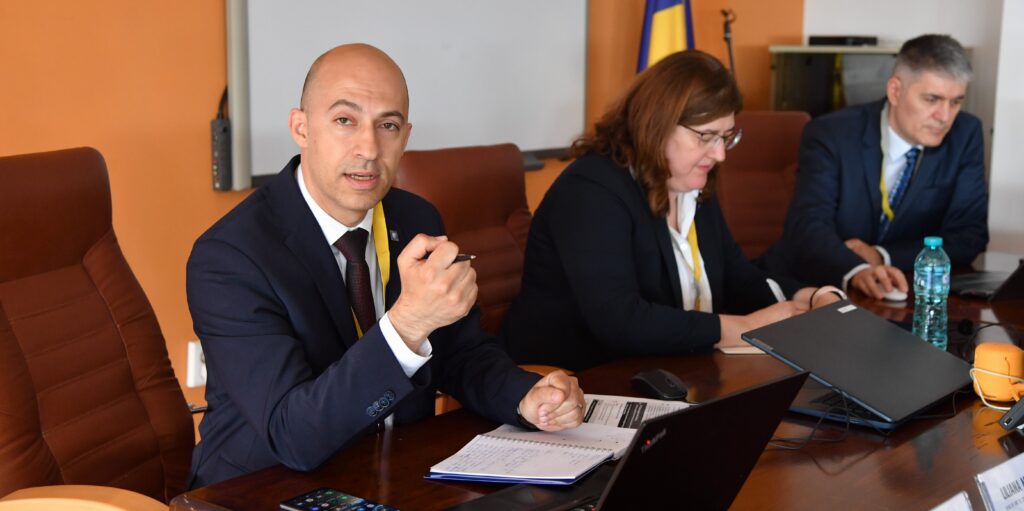
Chair:
Evangelos Englezakis, Training Manager, European Security and Defence College (confirmed)
Panelists:
Arnold Dupuy, Naval Postgraduate School, Atlantic Council in Turkey, Virginia Polytechnic Institute and State University (confirmed)
Liliana Musetan, Head of Unit at Council of the European Union (confirmed)
Manuela Catrina, Deputy Director of the National Cybersecurity Directorate (confirmed)
11:20 – 11:30 Coffee break
11:30 – 13:00 Panel 2. Artificial Intelligence in Cybersecurity: Opportunities and Risks
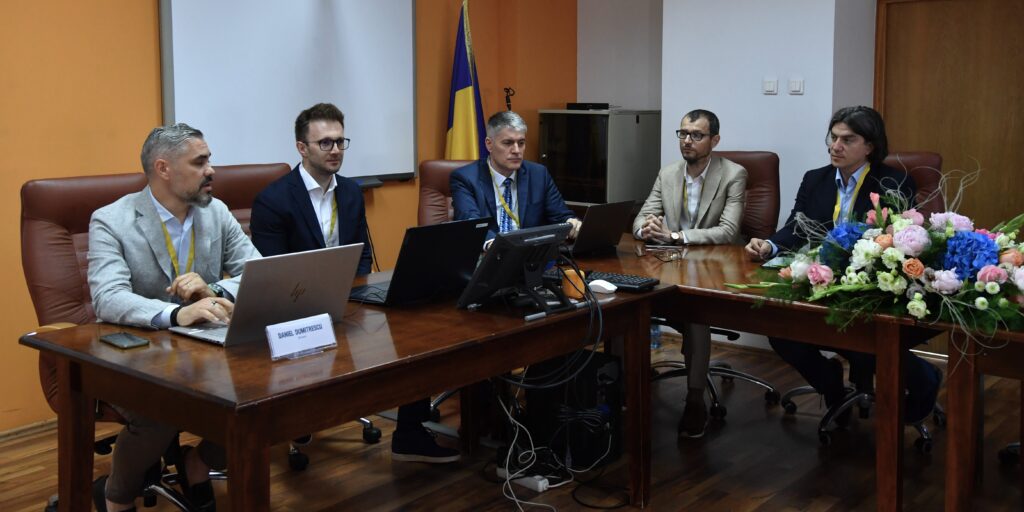
Chair:
Daniel Dumitrescu, CIO, InnovX (confirmed)
Panelists:
Bogdan Stefan, Managing Director Information Technology, EximBank (confirmed)
Radu Stanescu, European Cybersecurity Competence Centre Governing Board Alternate Representative (confirmed)
Mickael Leal, CEO, AllPriv (confirmed online)
Vladimir Ghita, CEO, Fort (confirmed)
Bogdan Moldovan, CEO, Axigen Messaging (confirmed)
Liviu Arsene, Director of Threat Research and Reporting at CrowdStrike (confirmed)
13:00 – 13:45 Lunch
13:45 – 15:15 Panel 3. Navigating Legal and Ethical Considerations in the Era of Growing Digitalization and Cybersecurity
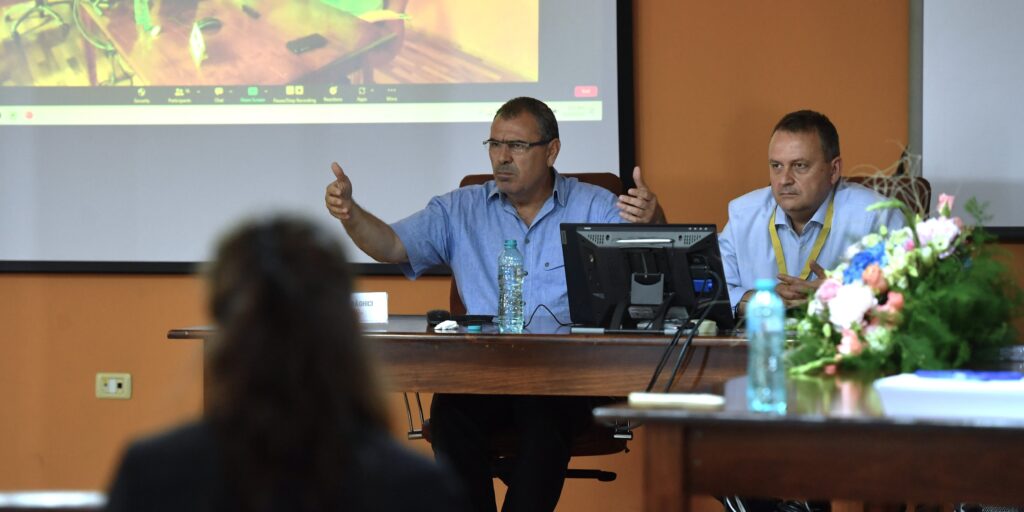
Chair:
Vasile T. Draghici, Ovidius University, Constanta, Chief Cybercrime Investigation Officer, MARCYSCOE (confirmed)
Panelists:
Radu Hanzu, Vice Rector of Constanta Maritime University (confirmed)
Remus Jurj, Chief Compliance And Ethics Officer, MARCYSCOE (confirmed)
Stanislav Copetchi, Secretary of State, Republic of Moldova (confirmed)
Sadac Zafer, Prosecutor Office, Constanta, Romania (confirmed)
Pavlo Krainii, Faculty of Law, Yuriy Fedkovych Chernivtsi National University, Ukraine (confirmed)
Ivan Toronchuck, Faculty of Law, Yuriy Fedkovych Chernivtsi and National University, Ukraine (confirmed)
Pavel Klima, Metropolitan University of Prague, Czech Republic (confirmed)
Mariana Mitra Nita, Ovidius University, Constanta
15:15 – 15:30 Coffee break
15:30 – 16:15 Guest Lecture
Lecturer:
Pantelimon George Popescu, Polytechnics University Bucharest, RoNaQCI Consortium, EuroQCI (confirmed)
16:15 – 17:00 Guest Lecture
Lecturers:
Gabriel Raicu, Vice Rector of CMU, The Director of MARCYSCOE (confirmed)
Daniel Ionita, Chief Cybersecurity Services Officer, MARCYSCOE, CEO CYMED (confirmed)
Day 2
21 June, 2023
09:00 – 10:30 Panel 4. Cybersecurity Cooperation in Democracies: A Comprehensive European Approach for Addressing Shared Challenges
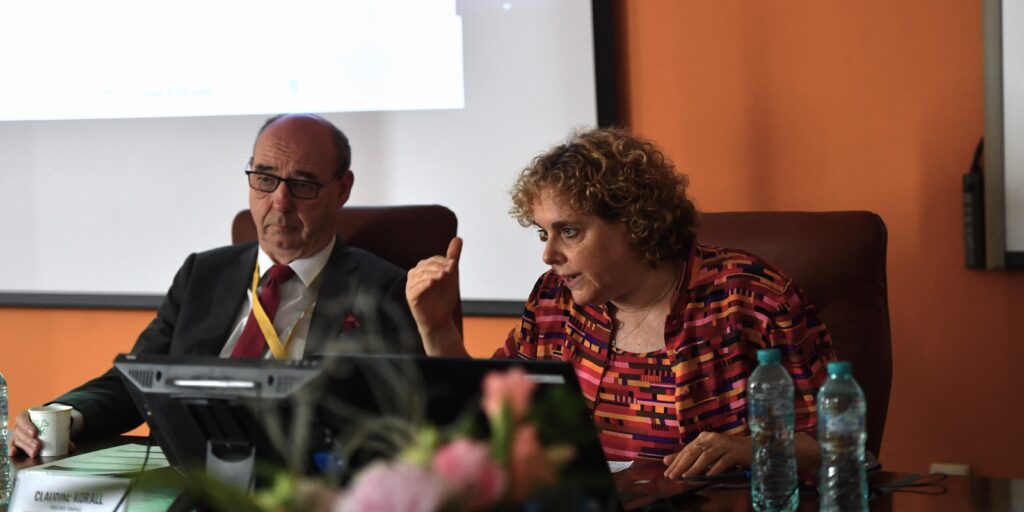
Chair:
John McCarthy, CEO, Oxford Integrated Systems (confirmed)
Panelists:
Claudine Korall, Directrice générale, Institut de Formation d’Intelligence Interculturelle – IFDII, Paris, France (confirmed)
Eleni Kapsokoli, University of Piraeus, School of Economics, Business & International Studies (confirmed online)
Alexandru Georgescu, ICI Bucharest (confirmed)
10:30 – 10:40 Coffee break
10:40 – 12:10 Panel 5. The European and Euro-Atlantic Cyber-Policy Landscape: Trends and Implications
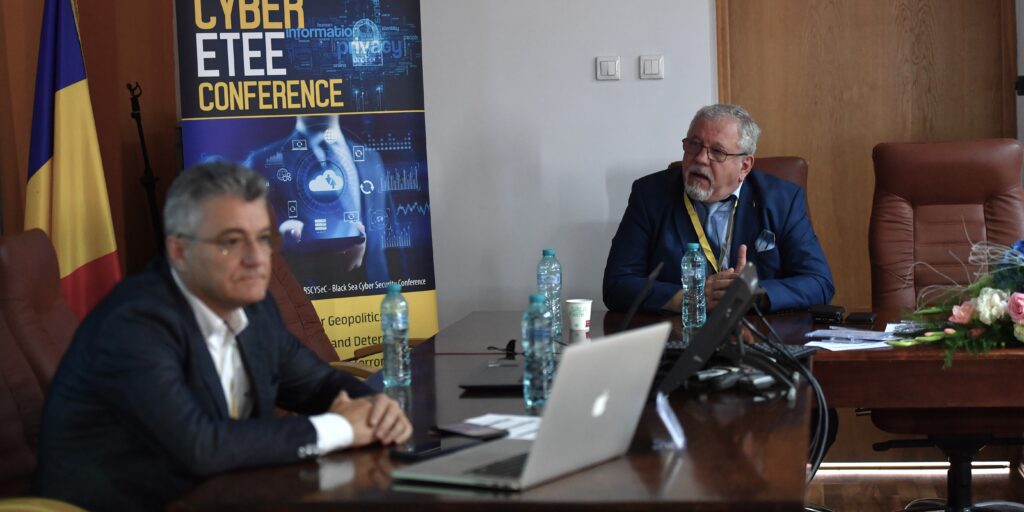
Chair:
Daniel Ionita, Chief Cybersecurity Services Officer, MARCYSCOE, CEO CYMED, Former Head of Horizontal Working Party on Cyber Issues (confirmed)
Panelists:
Tal Pavel, CEO, The Institute for Cyber Policy Studies, Israel (confirmed)
Andrew Liaropoulos, University of Piraeus, School of Economics, Business & International Studies (confirmed online)
Vasile V. Draghici, The President of ARECS, Chief Security Officer, MARCYSCOE (confirmed)
Liviu Mihai Danila, Vice President of ARECS, Chief Community Officer, MARCYSCOE (confirmed)
12:10 – 12:20 Coffee break
12:20 – 13:50 Panel 6. Securing Maritime Environments with Blockchain and IoT Technologies
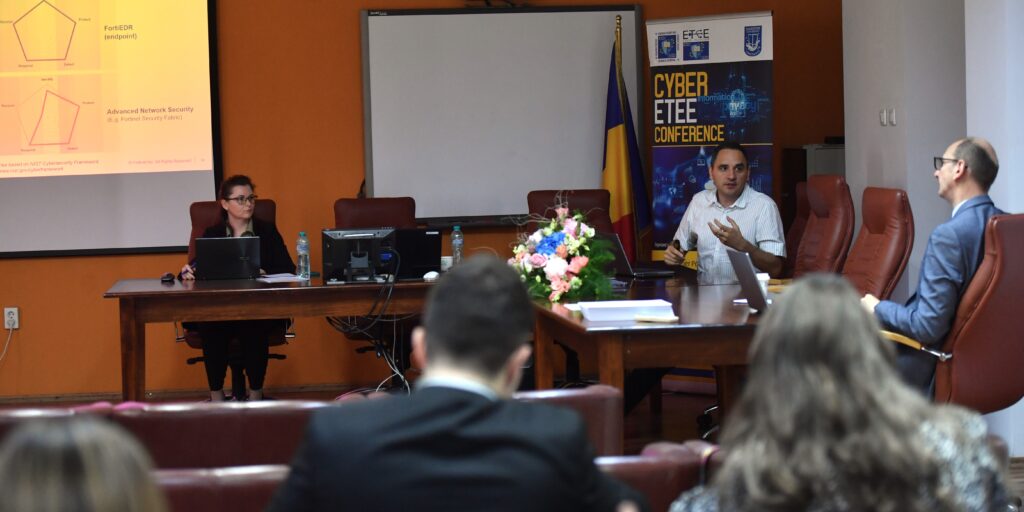
Chair:
Stefania Nita, ITC & University of Bucharest (confirmed)
Panelists:
Silviu Pufan, Senior Systems Engineer at Fortinet, Romania (confirmed)
Manuel Manolache, MARCYSCOE, DevOps – organism.ro (confirmed)
13:50 – 14:35 Lunch
14:35 – 16:05 Panel 7. EU and US Cybersecurity Trends: Challenges and Prospects in a Rapidly Evolving Landscape
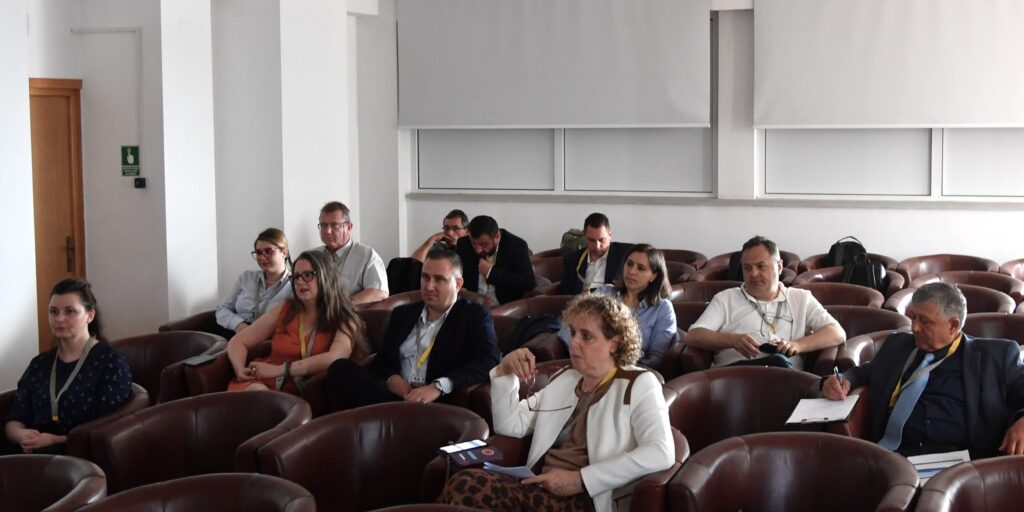
Chair:
Mircea Scheau, I2DS2, Member of the Advisory Board, MARCYSCOE (confirmed)
Panelists:
Linda Strick, Position Managing Director CSA EMEA (confirmed)
A.J. Nash, VP of Intelligence, USA (confirmed)
Salvatore Moccia, Head of Master and Doctoral School, EIT Digital (confirmed)
Marius Rosu, CMU Maritime Research Expert, Romania (confirmed)
16:05 – 16:15 Coffee break
16:15 – 17:00 Guest Lecture
Lecturer:
Thomas-Durell Young, Institute for Security Governance, Defense Security Cooperation Agency
Monterey Naval Postgraduate School
(confirmed online)
Day 3
22 June, 2023
09:00 – 10:30 Panel 8. Building Cyber Society Resilience: Strategies and Best Practices
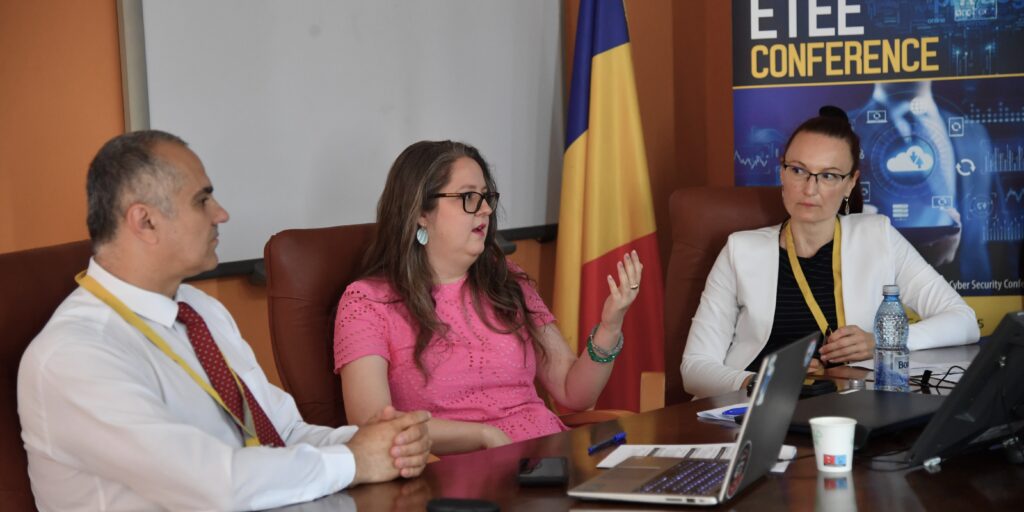
Chair:
Horatius Garban, Member of the Advisory Board, MARCYSCOE (confirmed)
Panelists:
Gabriela Matei, Emerging Disruptive Technologies Team, Euro-Atlantic Resilience Center, E-ARC (confirmed)
Maria Constantinescu, Regional Department of Defense Resources Management Studies – DRESMARA (confirmed)
Felix Staicu, CEO Cyber Dacians (confirmed online)
10:30 – 10:40 Coffee break
10:40 – 12:10 Panel 9. Securing Global Maritime Supply Chains Against Cyber Threats
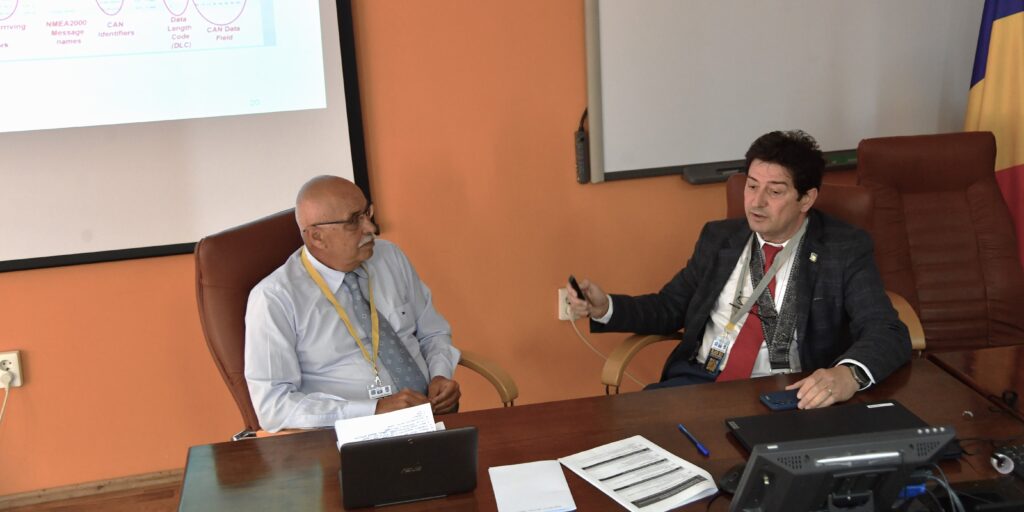
Chair:
Sorin Learschi, Director, Maritime Security Forum, Romania (confirmed)
Panelists:
Remus Zagan, Chief Research and Innovation Officer MARCYSCOE, Vice President of Senate, CMU (confirmed)
Ion Custura, Deputy Director, Maritime Security Forum (confirmed)
Adrian Sbarcea, General Inspectorate of the Border Police (confirmed)
12:10 – 12:20 Coffee break
12:20 – 13:50 Panel 10. Emerging Cybersecurity Threats and Challenges
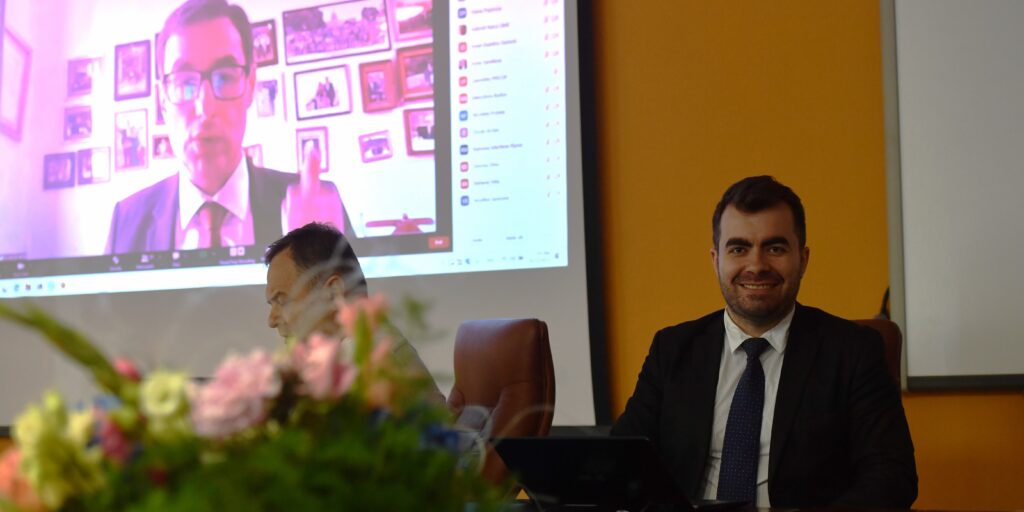
Chair:
Horatiu Moga, MARCYSCOE (confirmed)
Panelists:
Shota Gvineria, Former Ambassador, Georgia MFA, Baltic Defence College, Tartu, Estonia (confirmed online)
Simona Dinu, Constanta Maritime University (confirmed)
Cristina Dragomir, Constanta Maritime University (confirmed)
Anca Modreanu, Regional Account Manager, Fortinet (confirmed)
Alexandru Georgescu, ICI Bucharest (confirmed)
13:50 – 14:35 Lunch
14:35 – 16:05 Panel 11. The Role of Education in Promoting Maritime Cybersecurity Resilience: Current Initiatives and Future Directions
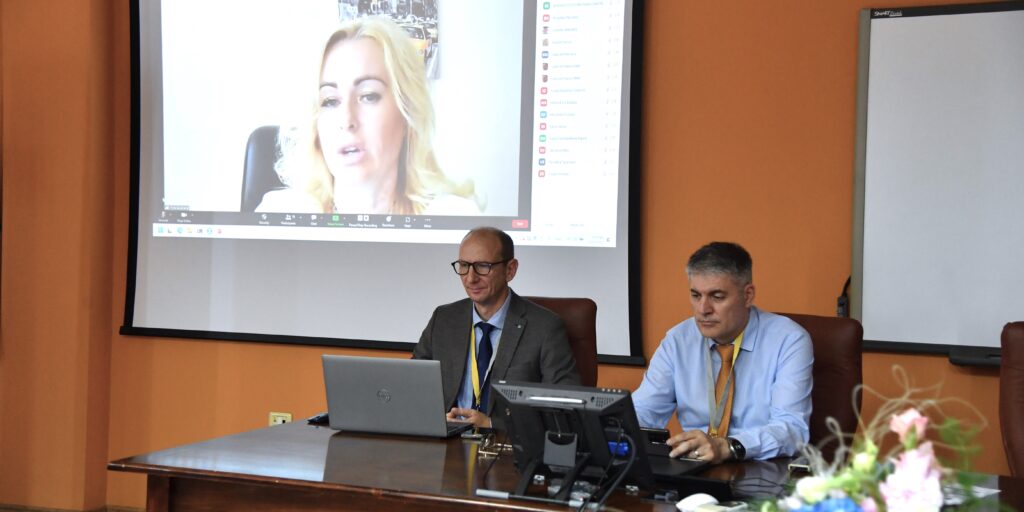
Chair:
Nicu Iancu, Vice President, MARCYSCOE, President, I2DS2 (confirmed)
Panelists:
Iryna Savelieva, Vice-Rector, Scientific Research and Education, Odessa National Maritime University (confirmed)
Veselina Spasova, Associate Professor, Nikola Vaptsarov Naval Academy (confirmed)
Gabriel Raicu, Director of MARCYSCOE, Vice-Rector for Innovation and Research, Constanta Maritime University (confirmed)
16:05 – 16:15 Coffee break
16:15 – 17:00 Networking Session
17:00 – 17:45 Guest Lecture
Lecturer:
Nicholas Andersen, CSFI Advisory Director, Principal Deputy Assistant Secretary Office of Cybersecurity, Energy Security, and Emergency Response at U.S. Department of Energy (DOE), Former Federal Cybersecurity Lead and Senior Cybersecurity Advisor for the Executive Office of the President, The White House (confirmed online)
17:45 – 18:15 Closing Ceremony
These Are
Our Speakers
Nicholas Andersen
Cyber and National Security Executive, U.S.A.
Adrian Liviu Arsene
Director of Threat Research and Reporting at CrowdStrike
Maria M. Catrina
Deputy Director, National Cybersecurity Directorate
Maria Constantinescu
Regional Department of Defense Resources Management Studies, Romania
Stanislav Copetchi
Secretary of State, Republic of Moldova
Liviu Mihai Danila
Board Member, MARCYSCOE
Vasile T. Draghici
Board Member, MARCYSCOE
Vasile V. Draghici
Board Member, MARCYSCOE
Daniel Dumitrescu
CIO, InnovX
Arnold Dupuy
Faculty at Naval Postgraduate School, U.S.A.
Evangelos Englezakis
Training Manager, the European Security and Defence College
Horatiu Garban
Head of Planning, ROU MoD Cyber Defence Command
Alexandru Georgescu
Researcher, ICI Bucharest
Vladimir Ghita
CEO, Fort
Radu Hanzu
Vice Rector, Constanta Maritime University
Niculae Iancu
VP, MARCYSCOE
President, I2DS2
Daniel Ionita
Board Member, MARCYSCOE
Remus Jurj
Board Member, MARCYSCOE
Eleni Kapsokoli
Ph.D. Fellow at the Doctoral School on CSDP of the ESDC
Shota Gvineria
Lecturer, Baltic Defence College, Georgia
Claudine C. Korall
President, Institut de Formation d'Intelligence Interculturelle, France
Sorin Learschi
Director, Maritime Security Forum
Andrew Liaropoulos
University of Piraeus
Manuel Manolache
MARCYSCOE, DevOps - organism.ro
Gabriela Matei
Emerging Disruptive Technologies Team, Euro-Atlantic Resilience Centre
John McCarthy
CEO, Oxford Integrated Systems
Salvatore Moccia
Head of Master and Doctoral School, EIT Digital
Horatiu Moga
Senior Cyber Expert, National Agency for Fiscal Administration, Romania
Bogdan Moldovan
CEO, Axigen Messaging
Liliana Musetan
Head of Unit, Council of the European Union
A.J. Nash
VP, ZeroFox, U.S.A.
Tal Pavel
Director, CyBureau, Israel
George Pantelimon Popescu
Professor, University Politehnica of Bucharest
Silviu Pufan
Senior Systems Engineer at Fortinet, Romania
Gabriel Raicu
President, MARCYSCOE
Iryna Savelieva
Vice-Rector, Odessa National Maritime University, Ukraine
Mircea Scheau
I2DS2, MARCYSCOE
Veselina Spasova
Associated Professor, Nikola Vaptsarov Naval Academy
Felix Staicu
CEO, Cyber Dacians
Radu Stanescu
European Cybersecurity Competence Centre
Bogdan Stefan
Managing Director Information Technology, EximBank
Linda Strick
Position Managing Director CSA EMEA
Cristina Dragomir
Associate professor, Maritime University of Constanta
Thomas Durell Young
Institute for Security Governance, Defense Security Cooperation Agency
Remus Zagan
Board Member, MARCYSCOE
A Few Words
About The Event Organiser
The Maritime Cybersecurity Centre of Excellence is a leading provider of cybersecurity services and solutions for the maritime industry. MARCYSCOE mission is to enhance the cybersecurity resilience of the maritime sector through innovative research, expert advice, training, and education. MARCYSCOE provides a wide range of cybersecurity services to public and private organisations in the maritime industry, including vulnerability assessments, penetration testing, incident response, and compliance assessments. MARCYSCOE experts bring together extensive experience and knowledge of the maritime industry and cybersecurity best practices.
They work closely with the university’s faculty and students to develop and deliver cutting-edge research and education programs that address the maritime sector’s complex cybersecurity challenges.
MARCYSCOE also collaborate with industry partners, governmental agencies, and other organisations to promote cybersecurity awareness, knowledge-sharing, and innovation in the maritime industry.
What They Say About Us



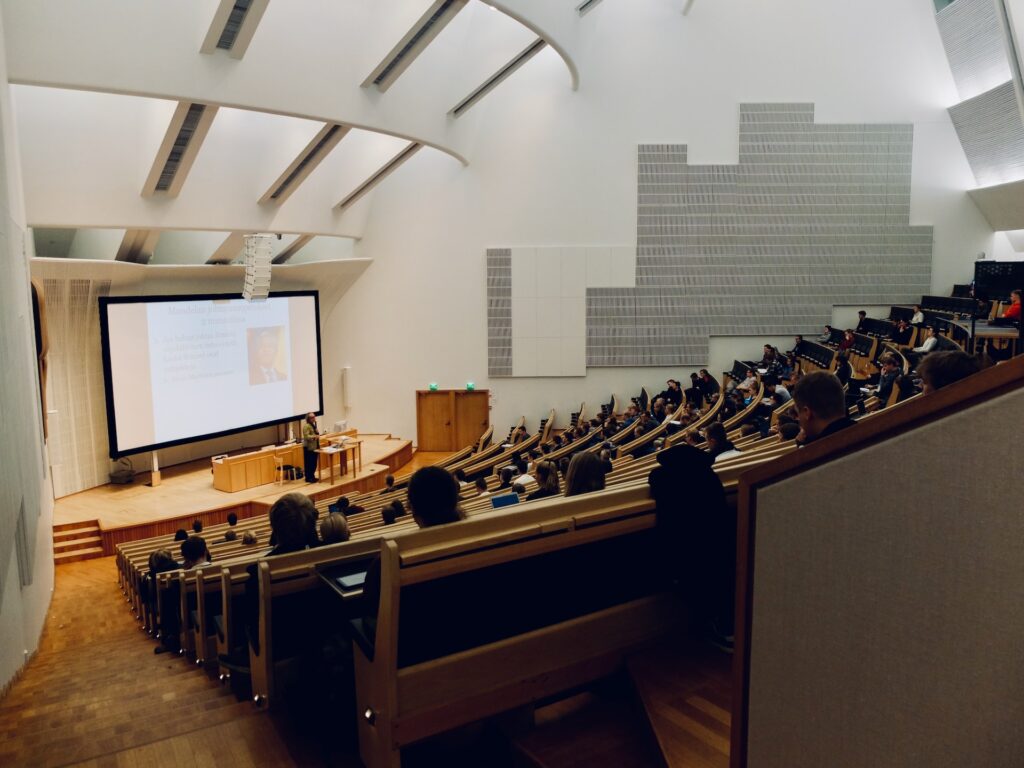


Trusted Hands Behind Us
Our Great Partners

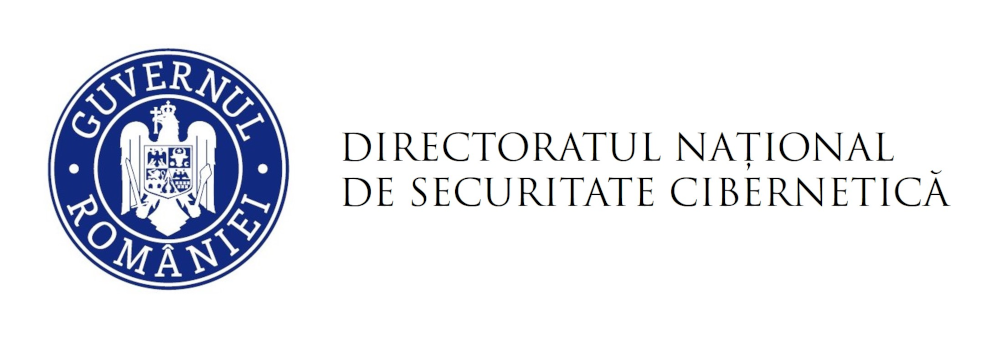

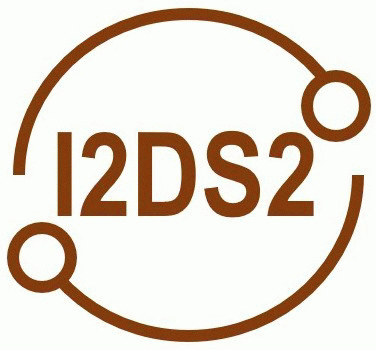
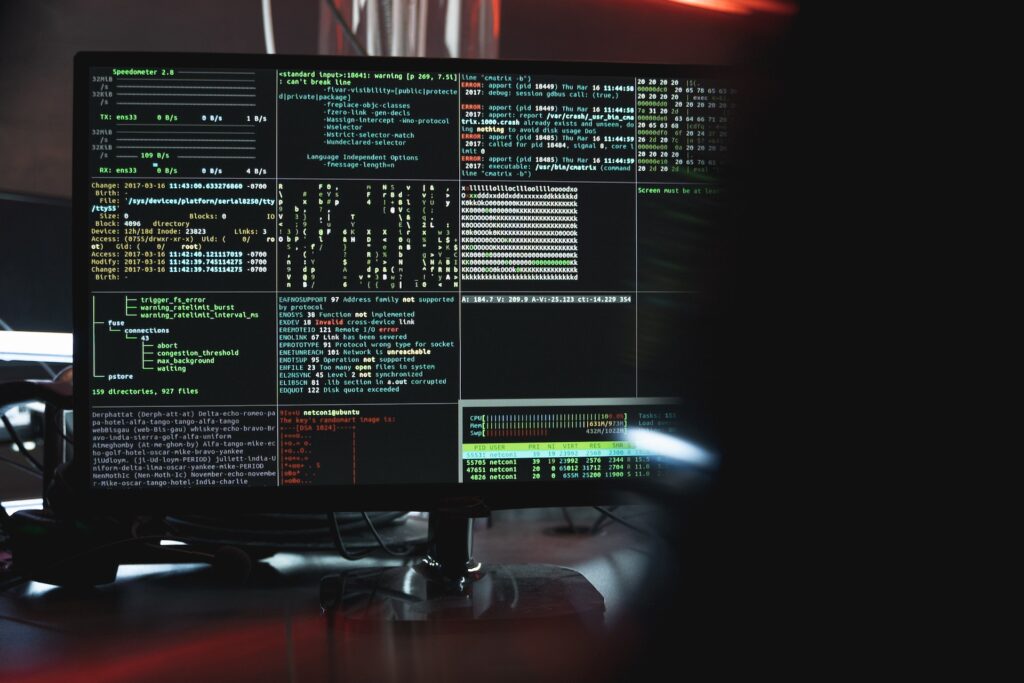


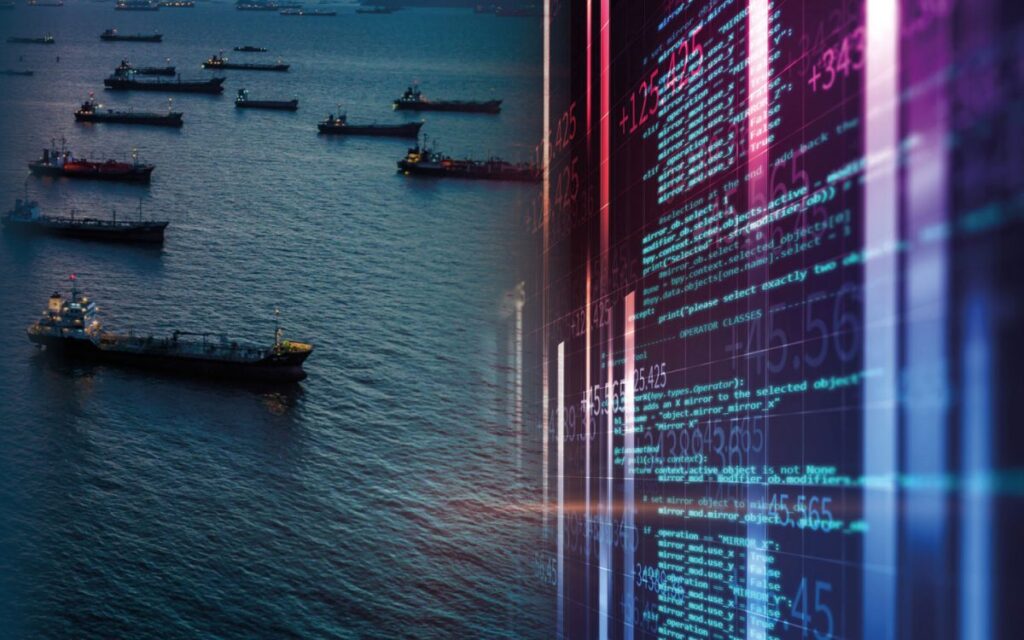
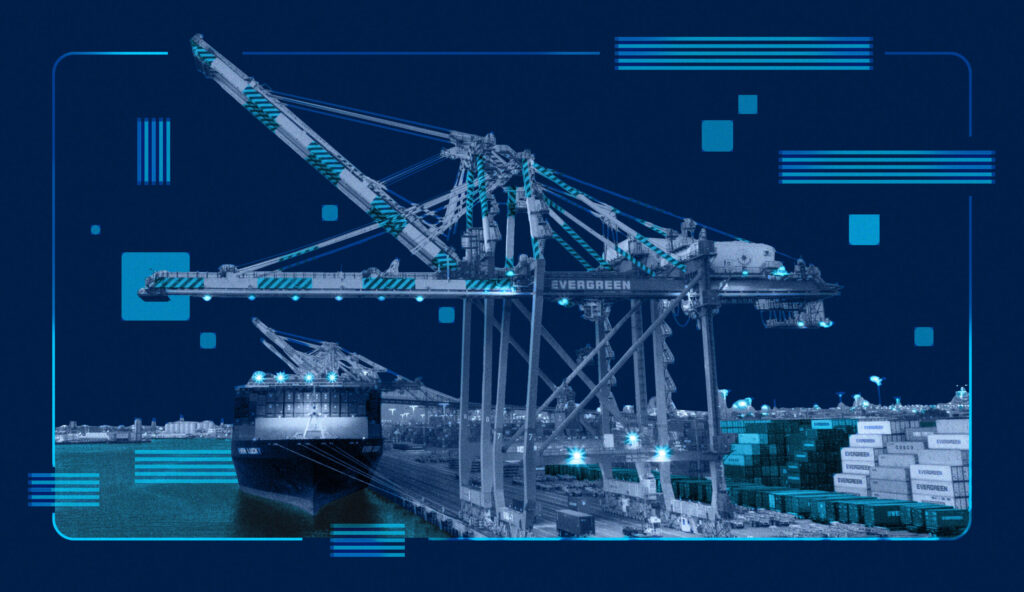

Venue
104 Mircea cel Batran Street, Constanta, Constanta County, 900663
MARCYSCOE is based at the Maritime University of Constanta, a Romanian public university that provides bachelor and master programs for the maritime industry.


